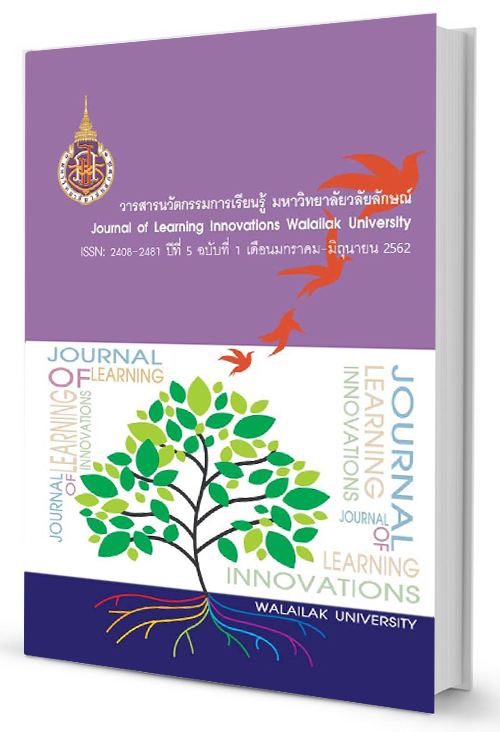Effects of Project-Based Learning Management on Sentence type of grade 2 secondary school students
DOI:
https://doi.org/10.14456/jli.2019.5Keywords:
Sentence type, Project-Based Learning ManagementAbstract
The current study aimed to 1) investigate effectiveness of Project-Based Learning Management on Sentence type of grade 2 secondary school students at the effectiveness standard of 80/80, 2) study effectiveness index of Project-Based Learning Management on Sentence type of grade 2 secondary school 3) compare the learning achievement of students learning with Project-Based Learning Management before and after taking the treatment, and 4) study satisfaction of students learning with Project-Based Learning Management on Sentence type of grade 2 secondary school. The participants were 56 grade 2 secondary students of Khonkaenwittayayon School under control of The Secondary Educational Service Area Office 25 selected by cluster sampling method using students’ classes as the clustering criterion. 2 research instruments were used in the study which were 1) Project-Based Learning Management, used in teaching in the topic of Sentence type for grade 2 secondary school students, including 6 learning plans requiring 2 hours each- 12 hours in total, and found effectiveness at 4.24 and 2) learning achievement test designed to be 4 choice multiple test of 30 items in total and found IOC at 0.60-1.00, discrimination at 0.20-0.40, difficulty at 0.40-0.80, and reliability at 0.75. 3) The satisfaction of students learning with Project-Based Learning Management on Sentence of 15 Item total Correlation at 0.21-0.90 and reliability Cronbach's alpha coefficient at 0.93. The statistics used to analyze data were percentage, mean score, standard deviation, and t-test
The results of the study were found as follow. 1. The effectiveness of Project-Based Learning Management on Sentence type of grade 2 secondary school students was found at the effectiveness standard of 93.13/86.30 which higher than the set criteria. 2. Effectiveness index of Project-Based Learning Management on Sentence type of grade 2 secondary school was found at 0.7491 which could be inferred that the students had learning progresses at 74.91 percent.
3.The result of the comparison of the learning achievement of students learning with Project-Based Learning Management on Sentence type before and after taking the treatment showed that the learning achievement after the treatment was higher that the learning achievement before the treatment with the statistical significance at .05. 4.The satisfaction of students learning with Project-Based Learning Management on Sentence type at overall is at good level ( Mean=4.30) Keyword: Project-Based Learning Management, Sentence type
References
Chakamrueng, T. (2008). Kanphatthana phaenkan chat kitcchakam kan rianru duai khrong ngan rưang yen Sira phro phra bo̜riban klum sara kan rianru phasa Thai chan matthayommasưksa pi thi so̜ng. [Development of a learning activity plan with the project on the evening of Sira Because the monk Group of Thai language learning for grade 2]. (Master’s Thesis). Mahasarakham, Thailand : Mahasarakham university.
Khotanon, D. (2010). Kanphatthanamantimidiabonkhrưakhaitamnaeokhqnsatraktiwit Rưangchanitlæ Nathikhongprayok Chanmatthayomsưksapithi 2. [Development of multimedia on a network based on constructivist subject type and functions of sentences Mattayom 2]. (Master’s Thesis). Mahasarakham, Thailand : Mahasarakham university.
Ministry of Education. (2008). Laksutkaenklangkansưksanaphưnthan Phutthasakrat 2551. [Basic Education Core Curriculum, 2008]. Bangkok, Thailand.
Phukiant, L. (2001). Khrongnganphưakanrianrulakkanlænaeothangkanchatkitkam. [Project for learning principles and guidelines for organizing activities]. Bangkok, Thailand: Chulalongkorn University.
Puranachote, T. (1999). KansonbaepburanakanNaipramuanbotkhwamkanriankan-
Sonlækan wichai Radapmatthayomsưksa. [Integrated teaching in the process of
Teaching and research articles Secondary level]. Bangkok, Thailand: Chulalongkorn
University.
Puangsombat, R. (2010). kanphatthana khwamsamat nai kan tae ngo̜ka yani sipet klum sara kan rianru phasa Thai chan matthayommasưksa pi thi nưng doi chai kitchakam khrong ngan . [The development of the ability to decorate the Yani 11 learning strand Mathayom 1 Thai language using project activities]. (Master’s Thesis). Mahasarakham, Thailand : Mahasarakham university.
Ratchapo, S. 2010. kanpriapthiap phon samrit thangkan rian thaksa kan an lae thaksa kan
khian klum sara kan rianru phasa Thai chan prathomsưksa pi thi si rawang rian duai mantimidia kap kan rian baep khrong ngan. [Comparison of learning achievement Reading skills and writing skills Thai language Grade 4 during multimedia lessons and project-based learning]. (Master’s Thesis). Mahasarakham, Thailand : Mahasarakham university.
Saensena, S. (2011). Kanphatthanabotriankhomphiotoechuaison Rưang Chanitkhongprayokchanmatthayomsưksa Pithi 2. [The development of computer- assisted instruction on types of sentences for grade 2. The development of computer-assisted instruction on types of sentences for grade 7]. (Master’s Thesis). Mahasarakham, Thailand : Rajabhat Mahasarakham University.
Seeda, R. (2008).kanphatthanakanrianrubaepkhrongnganrưangkhamrachasapklumsarakan
rianruphasaThai chan prathomsưksapithi6. [Development of learning project
in the word royal language, Thai language learning group Grade 6]. (Master’s Thesis).
Mahasarakham, Thailand : Mahasarakham university.
Srikhrưadong, N. (2009). PhonkanChatkitkamkanrianruphasathai Rưangtraiyangsangkhamdoichaikitkam Khrongngan Chanprathomsưksapithi 5. [The results of organizing Thai language learning activities The story of Trio Sangkham using the project activity grade 5.]. (Master’s Thesis). Mahasarakham, Thailand : Mahasarakham university.
Srisa-at, B. (2000). Kanwichaibưangton. [Preliminary research] bangkok : Suviriyasan
Thanakitrungren, A. (2000). khrongngan. [Project]. Academic Journal, The Institute for the Promotion of Teaching Science and Technology (IPST), 3(6), 17.
Yolao, et al. (2014). Kansưksakančhatkanrianrubaep PBL thidaičhakkhrongkansangchut Khwamruphưasangsoemthaksahaengsatawatti 21 khongdeklæyaowachon: Čhakprasopkankhwam Samretkhongrongrianthai [The study of PBL-based learnin management received from the knowledge-building project to enhance the skills of the 21st century of children and youth: based on the success experiences of Thai schools] .Bangkok, Thailand: Thipphayawisut.
Yuprapai, D. (2007). Phonkanrianruphasathaidoikhrongngan Rưang Khamrachasapchanprathomsưksa Pithi 6. [The effect of learning Thai language by the royal word project, Prathom Suksa 6.]. (Master’s Thesis). Mahasarakham, Thailand : Mahasarakham university.
Downloads
Published
How to Cite
Issue
Section
License
เนื้อหาและข้อมูลในบทความที่ลงตีพิมพ์ในวารสารนวัตกรรมการเรียนรู้ มหาวิทยาลัยวลัยลักษณ์ ถือเป็นข้อคิดเห็นและความรับผิดชอบของผู้เขียนบทความโดยตรง ซึ่งกองบรรณาธิการวารสาร ไม่จำเป็นต้องเห็นด้วย หรือร่วมรับผิดชอบใดๆ
บทความ ข้อมูล เนื้อหา รูปภาพ ฯลฯ ที่ได้รับการตีพิมพ์ในวารสารนวัตกรรมการเรียนรู้ มหาวิทยาลัยวลัยลักษณ์ ถือเป็นลิขสิทธิ์ของวารสารนวัตกรรมการเรียนรุ้ มหาวิทยาลัยวลัยลักษณ์ หากบุคคลหรือหน่วยงานใดต้องการนำทั้งหมดหรือส่วนหนึ่งส่วนใดไปเผยแพร่ต่อเพื่อกระทำการใดๆ จ้อต้องได้รับอนุญาตเป็นลายลักษณ์อักษรจากวารสารนวัตกรรมการเรียนรู้ มหาวิทยาลัยวลัยลักษณ์ก่อนเท่านั้น


